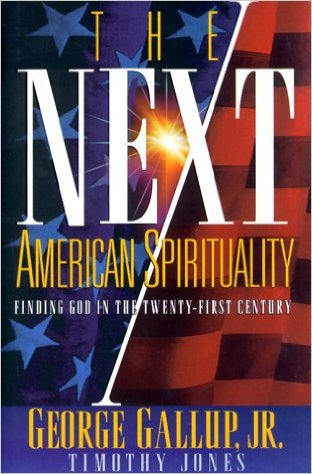George Gallup: The Next American Spirituality
 George Gallup with Timothy K. Jones, The Next American Spirituality: Finding God in the Twenty-first Century (David C Cook, 2000), 205 pages.
George Gallup with Timothy K. Jones, The Next American Spirituality: Finding God in the Twenty-first Century (David C Cook, 2000), 205 pages.
George Gallup outlines what he feels will be the next true spiritual movement in America. This book is a survey that answers two main questions. First, what is the daily shape of faith behind the public expressions? And secondly, how do people experience God in everyday life? The thrust of his ideology comes from his statistics of the need to experience spiritual growth (27). The church stands in the threshold of this opportunity and must learn how to step forward into its presence (24). Gallup has come to the conclusion that people want practical everyday approaches to spiritual life. They want “the prayers on the run, and spiritual practices squeezed into the crevices of a busy day…” (136). In this they need to be handed down the practices from centuries past that have been tested and proven wise. In this churches face two age group challenges. First, is to understand the first fully post-modern generation, the millennials. The second, is to address the needs of empty nesters who are the fast-growing group of pre-retirement households.
Gallup likens this to “forming souls” which requires diligence and practice (136). The 21st century congregations will have to place prayer over program, presence over practice, and authenticity over numbers (136). Without this approach the 21st century church will not be able to minister to a nation that longs for meaningful spirituality. The task for the church will be to ground the desire for meaningful spirituality in the concrete truth of God’s word (128). The problem with training the present church members is that they suffer from Biblical illiteracy. According to Gallup we lack the ability to present the gospel on a basic level that allows people to understand the profound truths of Christian faith (131). This biblical illiteracy usually translated into spiritual blindness. He points out that the church needs simple incremental things that nurture their spiritual journey. These include having a spiritual focus to their activities, prayer without ceasing, and always asking spiritual implications questions about situations they face. As the churches themselves place priority on prayer, presence, and authority they become interwoven with their discipleship and operational methods. This intern roots itself into the daily personal discipleship of the individual members. The goal is to aid the post-modern society in experiencing an authentic spirituality outside on a daily basis. As the church models authenticity the people live authenticity. This modeling of authenticity can only be achieved when the spiritual blindness, or biblical illiteracy, is overcome.
“Few people know the spiritual profile of America better than George Gallup, Jr. In this book written with Timothy Jones, Gallup reveals the spiritual challenges facing Christians in the new century. It is information vital to the church if we are to properly and powerfully challenge new heresies and take advantage of new opportunities to spread the Gospel of Jesus Christ.” —Cal Thomas, Syndicated columnist
Our churches today have become stuck on providing programs rather than experiences. We have to get ourselves to the point where we are implementing strategies that will help people experience a spiritual growth journey.
Reviewed by David Redden
Preview: https://books.google.com/books/about/The_Next_American_Spirituality.html?id=c02nyqbnW20C
Note from the editor: this review originally appeared on the Pneuma Foundation website in January 2004. The Pneuma Foundation is the parent organization of PneumaReview.com.
Category: Ministry, Winter 2016


